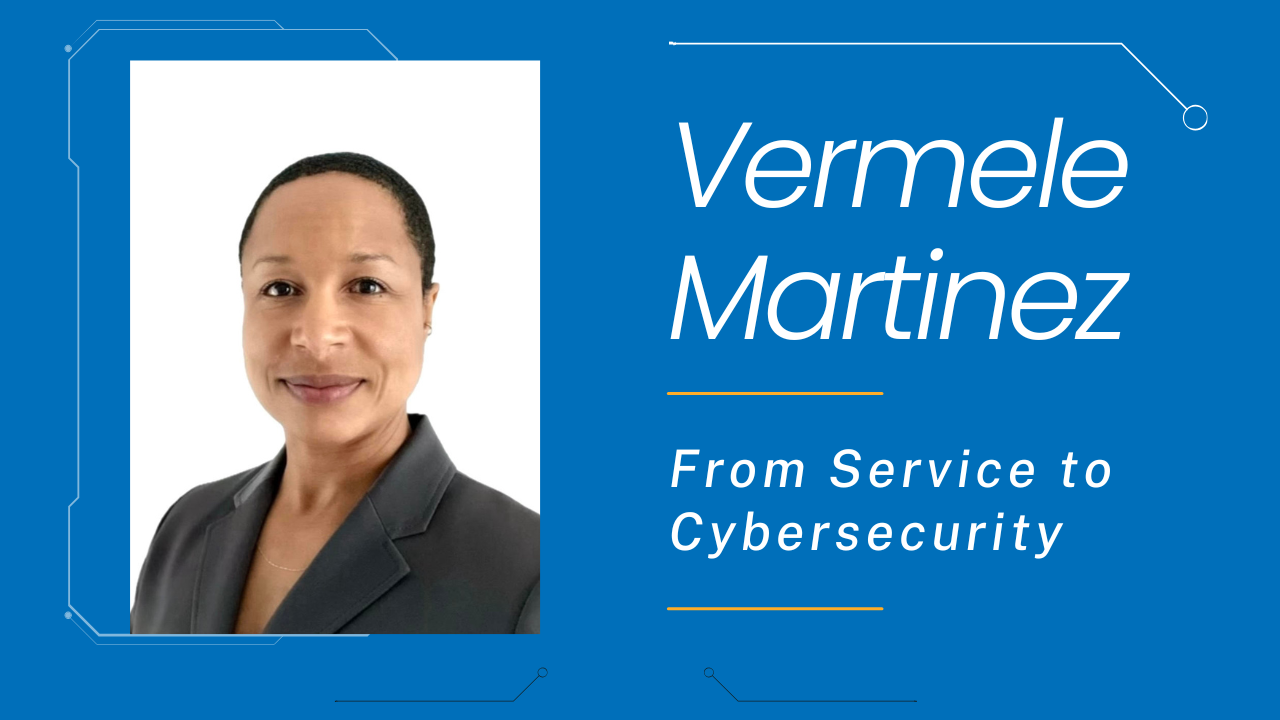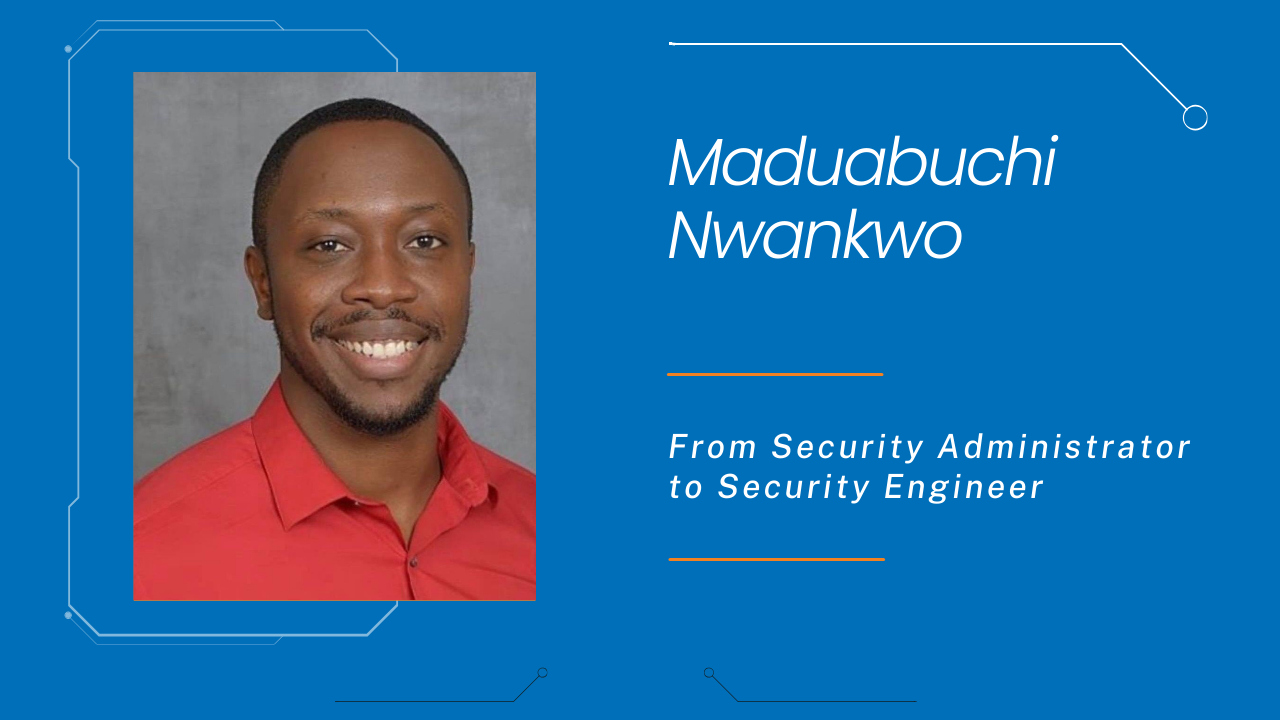Apprentice Success Story: Vermele Martinez
From Service to Cybersecurity: Vermele Martinez's Apprenticeship Journey at Centene
When Vermele Martinez started her cybersecurity apprenticeship at Centene through CyberUp, she was not just changing jobs. She was changing careers, routines, and even how she saw herself. A former leader in the military and a busy parent, she stepped into a new field where she was the learner again. Her journey shows what is possible when humility, hard work, and the right support come together.
Finding a New Mission in Cybersecurity
Before cybersecurity, Vermele’s life was shaped by a military career that required frequent moves and constant adjustment. That lifestyle made it hard to build a steady civilian career, especially while raising children and often carrying the load at home. When she found CyberUp and the Transition Assistance program, it felt like a new mission that fit her skills and determination. The apprenticeship at Centene gave her a structured way to enter cybersecurity with real work, real expectations, and real support.
Working remotely for Centene, Vermele discovered that a virtual office can still feel like a team. Her boss checked in regularly and held one-on-one meetings that helped her stay engaged and informed. Knowledgeable teammates were willing to share information, answer questions, and explain complex topics. That supportive work environment turned what could have been an intimidating transition into a blessing she was grateful for every day. One of her proudest moments was successfully completing a major project and receiving positive feedback from her leaders. That experience reinforced that she did belong in cybersecurity and that her effort was paying off.
Learning to Lead by Following
In her previous career, Vermele was used to being the one in charge. Stepping into an apprentice role required a shift in mindset. She talked about the importance of understanding where you stand on the “totem pole,” based on your knowledge and experience. Instead of seeing that as a downgrade, she treated it as a chance to learn the game before trying to call the plays. That humility became one of her biggest strengths.
Her standout success during the apprenticeship was leading the preparation for a quarterly business review. It was a big responsibility for someone new to the company and the field. To do it well, she listened closely, asked clear questions, and relied on the guidance of her team. The experience taught her that you can lead even while you are still learning, as long as you respect the expertise around you.
At the same time, she was growing as a Cloud Security engineer. Gaining technical proficiency did not happen overnight. She spent time in meetings as a quiet observer, almost like a fly on the wall, just absorbing how more experienced professionals talked about security. She stayed informed on cybersecurity trends through those meetings, through certification requirements, and through conversations with her husband, who also works in IT. All of that helped her connect theory to real situations.
Building Skills One Certification at a Time
Behind the scenes, Vermele was balancing work, family, and intense study. She was working on practice tests for her RTI exam and did not feel comfortable with her scores yet. Syanne, her CyberUp contact, estimated she was about 80 percent of the way there and reminded her that the last stretch often comes during the practice test phase. Time management was a real challenge because she was juggling children, a full workday, and the responsibilities of everyday life.
To keep growing, Vermele turned to training tools like Pluralsight, where she focused on AWS and Azure. She worked toward certifications, including Cloud+, RTI, and AWS Cloud Practitioner. CyberUp made sure she knew about discounted certifications available to alumni and how to access them through the alumni portal. Vermele and Syanne also talked about the importance of feeling truly ready before using a voucher or taking an exam, so she would not have to worry about paying for retakes.
Through that process, Vermele learned one of her biggest lessons. With hard work and a commitment to learning, you can do far more than you ever imagined. She saw that technical skills are not magic. They are built one lab, one video, and one practice test at a time. That realization gave her confidence to keep pushing, even on the tired nights after her kids went to bed.
Looking Ahead and Giving Back
Life did not slow down while Vermele was in her apprenticeship. She managed the realities of being, in practice, a single parent much of the time while her husband worked in another part of the state. She stayed up late to work on her own projects and study, often sacrificing sleep for a better future. When she and her family got Covid twice, with the first case lasting months, it would have been easy to step back. Instead, she kept moving forward, which earned genuine respect from Syanne, who often praised her strength and resilience.
As she settled into her role at Centene, Vermele grew more curious about the technical experts around her. She admired the architects at her company, especially the way they designed services and explained complex network interactions so clearly. That curiosity is shaping her next steps, as she considers how to deepen her technical skills and maybe move into more advanced roles in the future.
Vermele is not finished with CyberUp just because her apprenticeship wrapped up. She wants to stay involved as a mentor or speaker and share her story with new apprentices who are thinking about a career change. Her advice to them is simple and powerful. Go for it and embrace new opportunities, because you really can do anything with hard work and learning. She plans to keep studying through Pluralsight, pursue certifications like AWS Cloud Practitioner, stay humble in every new role, and reach back to help the next group of apprentices find their own path.
At CyberUp, we believe the cybersecurity industry should reflect the world we live in—diverse, driven, and filled with people like Vermele who bring new perspectives and a hunger to learn. Her story is a powerful reminder to go for new opportunities, because you really can do anything with hard work and learning.
Congratulations, Vermele. We're proud to have you in our alumni community and can’t wait to see where your path leads next.
Ready to Build a Stronger Cybersecurity Workforce?
If you're an employer looking for driven, hands-on cybersecurity talent like Vermele, CyberUp’s Apprenticeship Program can connect you with candidates who are trained, motivated, and ready to contribute on day one.
Thinking About a Career in Cybersecurity?
If you’re curious about cybersecurity but don’t yet have your CompTIA Security+ certification, CyberUp’s LevelUp Training program might be the perfect place to start. We provide accessible, self-paced training to help you earn your certification and prepare for apprenticeship opportunities.









.png)
